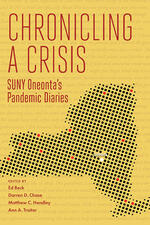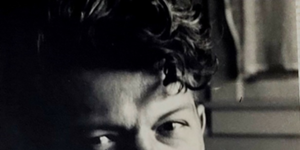
Through a Lens Smartly
Chronicling a Crisis: SUNY Oneonta's Pandemic Diaries
Guest post by Ann Traitor
“She didn’t take anything seriously. She was literally the stupidest person ever! I just wanted to shake her and say, ‘what is wrong with you? Don’t you get what’s going on here?”
“What?? You are totally wrong! She was dealing with the situation!”
“That’s my point – she was not dealing with it at all! She was just worried about the food, her makeup, some stupid girls who joined them and…”
“She was worried about life and making life more normal! She completely got it!”
Before the voices raised any higher and before any students launched from chairs, I intervened. I would have intervened sooner had I not been taken by complete surprise at the animation in the room. This was, after all, a discussion of a primary source reading in a late afternoon history class, something not normally associated with lots of animation, much less “verbal fisticuffs.”
The unlikely sources of this heated exchange were the wartime diary entries from Mass Observation, a project started in the 1930s in Great Britain to discover what the British people really felt about the events of that tumultuous decade. By the time the war started, it was a well-known project that was open to all and sundry, the only requirement being an enthusiasm to write and a desire to have your opinions recorded. Since we were studying World War II, I had selected entries from various age groups throughout the war years to give a representative sampling of life on the home front in England. It was hard to pick and choose but the one diarist I knew I had to choose was Muriel Green. Most of my students were eighteen or nineteen years old and Muriel was the same age when the war broke out and she started her diary. I thought it would be enjoyable for them to read about someone their own age. Muriel had been working in a village garage but eventually joined the war effort by becoming a gardener. In her war diary entries, she wrote candidly about her family, her feelings, her work, and her travels. She wrote very sparingly of the war. For my students, this was the very problem: wasn’t this a war diary? Where was the war part? Why was she writing about kissing boys that were soon to ship out? Why did she not wear her gas mask for fear it would ruin her hair on a rare night out – was she so oblivious? What about the war?
These were good questions all. “How can we categorize her work?” I asked them. “Is this ‘life through a war lens’ or ‘war through a life lens’?” Those of you, Dear Readers, sitting on the edge of your seats now will be relieved to learn that, just as quickly as tempers flared, they cooled down to a more manageable – and thoughtful- climate. The students started to discuss what it might mean to live through a world war right now, to completely change their lives right now, and to somehow stay sane. They came to the agreement that the war was there all the time in her diary entries. They pointed out the entries dealing with “gas mask hair,” the joy of getting a cake made with real butter and not margarine, the pressure to bring in all of the harvest so England would not starve, the “kissing dilemma” for boys being shipped to the front, and the fear of the future after Hiroshima.
At the end of the class, as the students were filing out, I reviewed in my mind what had just happened. No, not the fact that students were animated in a history class, but the power of a person’s life. Every diarist left each student with a different lesson. Some saw themselves in the entries (“Yeah, I hate to say it, but I would have felt like that too.”), others pondered their potential reactions in similar situations (“Could I be that brave?”) and some saw warnings to future generations (“Nuclear war scares me to death”). Most people who write in a diary or journal do so for themselves, as a way of examining their lives, to keep a tally of the events so far and how they stack up. I have learned, though, that these works are so much more than that. They can also help future readers discover something about themselves and create a link from the future to the past. When the COVID pandemic hit, these experiences were my catalyst for replicating the Mass Observation approach of recording daily life at my own college. Much like the Mass Observation writers before us, we wrote because we needed to write. We never dreamed it would become a book, Chronicling a Crisis: SUNY Oneonta’s Pandemic Diaries.
Although diaries were replaced by blogs, my advice to you, Dear Reader, is to start a record yourself—you never know how it may inflame a history student in years to come.
Ann A. Traitor is Adjunct Assistant Professor of History at SUNY Oneonta.


